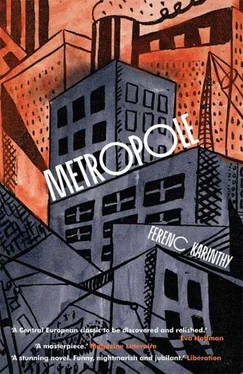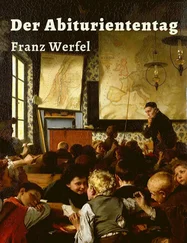What he chiefly missed was reading, the sight of familiar words. At home he spent half his life or more in libraries among books, occasionally as much as eighteen hours in a day and he was not prepared to break the habit and give up. Out of sheer desperation he took out the volume of short stories he had bought at the second-hand book market. He leafed through it again without understanding a word, contemplating the title page with its picture of the harbour and that deep blue sea, its palms and the little white houses twinkling on the hillside. Then he gazed at the photograph of the author on the flap, that full-faced figure in his pullover with his crew-cut hair and his faintly mocking expression and he still looked familiar. He wondered where he might have seen him, who he reminded him of, why he was drawn to him. Was it the ironic look? That lazy watchfulness in his eye? One evening he returned tired from his work at the market and caught sight of himself in the bathroom mirror just as he was suppressing a yawn and it suddenly became obvious: the man in the photographs reminded him of himself. Maybe that is why he found him sympathetic, why he had picked his book out among so many others. Was it that he found his own face attractive?
And time and again the same most terrible of questions returned to torture him. What about his family at home? Time would not have stood still for them either. Were they well and in good health? Were they alive at all? And if so what did they make of the extraordinary fact that they had heard nothing from him or about him for close on three weeks? It was pointless trying not to think of it, his entire nervous system was full of such thoughts. If only he could send a message to them, however short, simply to say that he was alive even though he had no idea in what part of the world…
He hadn’t seen a post office anywhere but they clearly had to exist. Maybe he had passed them by without spotting them. Nor did he see any post boxes, not in the hotel lobby or in the street nearby. He tried looking for postcards and stamps at the stalls in the hotel lobby but there was nothing on display and from the shopgirls’ speech and gestures he surmised that they either hadn’t understood him or that the articles he required were to be found elsewhere. But where?
He tried taking a plain piece of paper, folding it into the shape of a letter and addressing it to his wife though the mere writing of the letter upset him. His emotions ran away with him. He tried to ignore them and took the trial letter down to the reception desk and gave it to the clerk on duty. But the man just turned it round and round in his hand and stared at it, clearly not recognising the Latin script. Or perhaps he had no idea at all what to do with it. Maybe it was not part of his duties. He certainly did not want to be left with it because he pushed it back across the counter with a few short polite words. Thinking the lack of a stamp might be the problem, Budai took out some money and tinkling it in his palm, offered it to him, asking him to take what was necessary, then putting a few coins down in front of the clerk with a questioning look as if to ask whether that was enough. The man — an older, respectable looking chap — must have misunderstood him, taking it for a bribe of some sort for he snapped out a few sharp words and swept the coins away before turning away from him altogether and attending to the next in the queue.
Nevertheless Budai did not give up on the idea. Surely it would still be worth writing a letter. He could just leave it on the counter at reception when someone else was on duty, along with more than enough money to cover the cost of postage then quickly disappear before it could be returned. If there were the remotest chance of the letter reaching his wife the post office at home would be able to work out where he was and when he wrote it from the stamp or the franking, but he kept delaying the task even while he was weighing up his chances for neither his mind nor hand was up to it. Maybe he simply couldn’t find the right first words that would enable him to tell her what had happened to him. However he put it, he was incapable of summing it all up.
So he turned his attention back to the telephone in his room. He dialled at random wherever his fingers happened to land and rang unknown acquaintances he had rung before. It wouldn’t matter now if they presented him with a bill this coming Friday, he couldn’t pay anyway. When somebody picked up the phone at the other hand he shouted down the line, the same words each time, for hours on end, forcing himself to be patient: he kept repeating the name of his home town and his home phone number as well as the six numbers he could at last manage in the local language. He did so in the hope that at some point he would hit on the exchange where long-distance calls were connected. Or if not precisely that perhaps he might come across some other utility that would be able to transfer his call if only he kept repeating the number often enough or obstinately enough. But however much he shouted all he got by way of answer was the muttering and harrumphing of various men, women and children, nothing at all to indicate that anyone had understood. He spent the whole evening doing this until, seized by a sudden helpless fury, he smashed down the receiver and, sweating profusely, cursed his fate and beat the wall with his fists so the neighbours knocked back. What insanely ill luck had landed him here? Why him? Why should fate have chosen him for this? Why, why, why, why?
Having calmed down a little he stared — how many times had he done this? — at the oil painting above the table, that winter landscape with its snow-laden fir trees and those delicate fawns bounding away into the distance. He knew every detail by now to the point of boredom but it was his only reminder of nature, the world beyond the town that was holding him prisoner. That was if that world existed anywhere beyond his imagination.
He still hadn’t discovered from Bebé what her shifts were, where she went after work, what her telephone number was, where she lived, where she might be found and so forth. Although the girl was remarkably adept at picking up some things, she seemed to have no idea when it came to questions like this. Either that or she was pretending not to understand. Nor was he any more successful when he attempted to observe her entering or leaving the building or indeed at seeing her anywhere in the building apart from in the lift.
He did, however, know her well enough to try to ask her to take him to a railway station or an airport. But when the opportunity presented itself — on the eighteenth floor again — and Budai attempted to suggest this, even drawing the relevant means of transport Etete showed no inclination to help him but grew sad and tearful. Why should it upset her so much that he wanted to go away? He tried to console her by stroking her but thanks to his clumsiness the movement came out all wrong and he found himself like an idiot clutching her elbow, not knowing what to do with it. The linguistic chasm between them was too wide however much they both wanted to cross it. And now the lift was being called again. There was never enough time: they never had a moment to themselves.
The same night, just when he had bathed and was preparing to go to bed, the light in the room went out. He took a peek out into the corridor and then through the window: there was darkness everywhere. Not even the streetlights were on. All he could see was car headlights streaming through the black air. There must have been a major fault at the power station, something that affected the whole district because there was no light to be seen, not even in the distance. It didn’t particularly worry him. He did what he had to do. He was accustomed to the layout of the room and felt his way to bed. He had nothing to read anyway so, though he was not a bit sleepy, he crawled in and made himself comfortable.
Читать дальше












